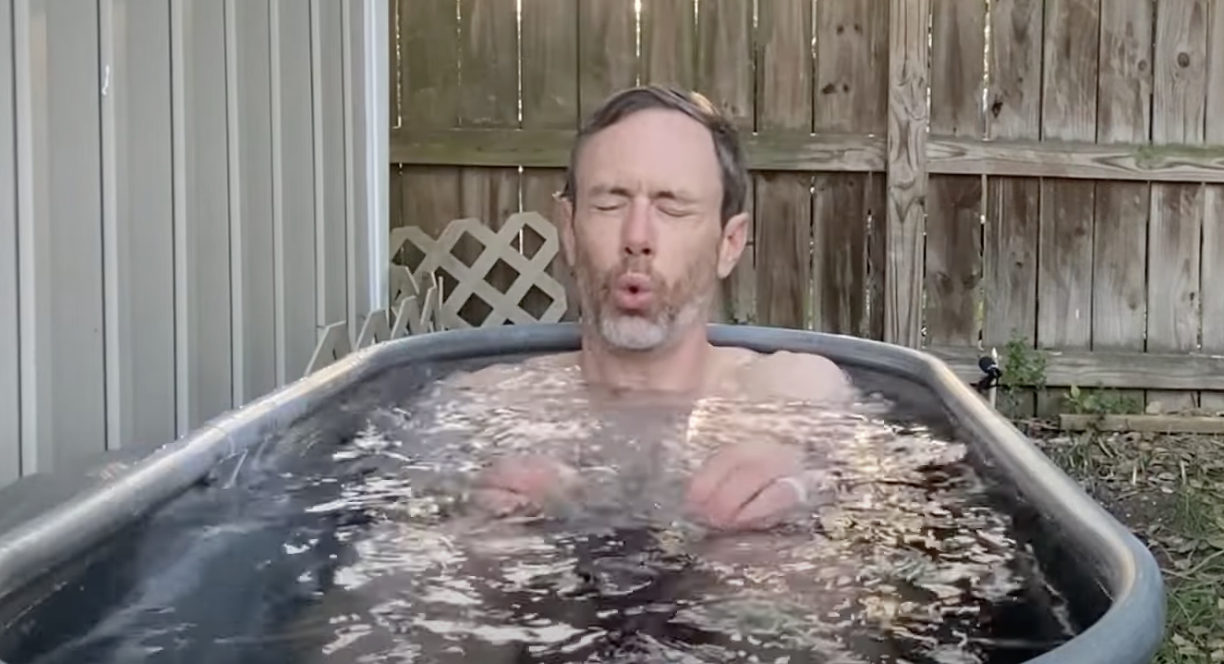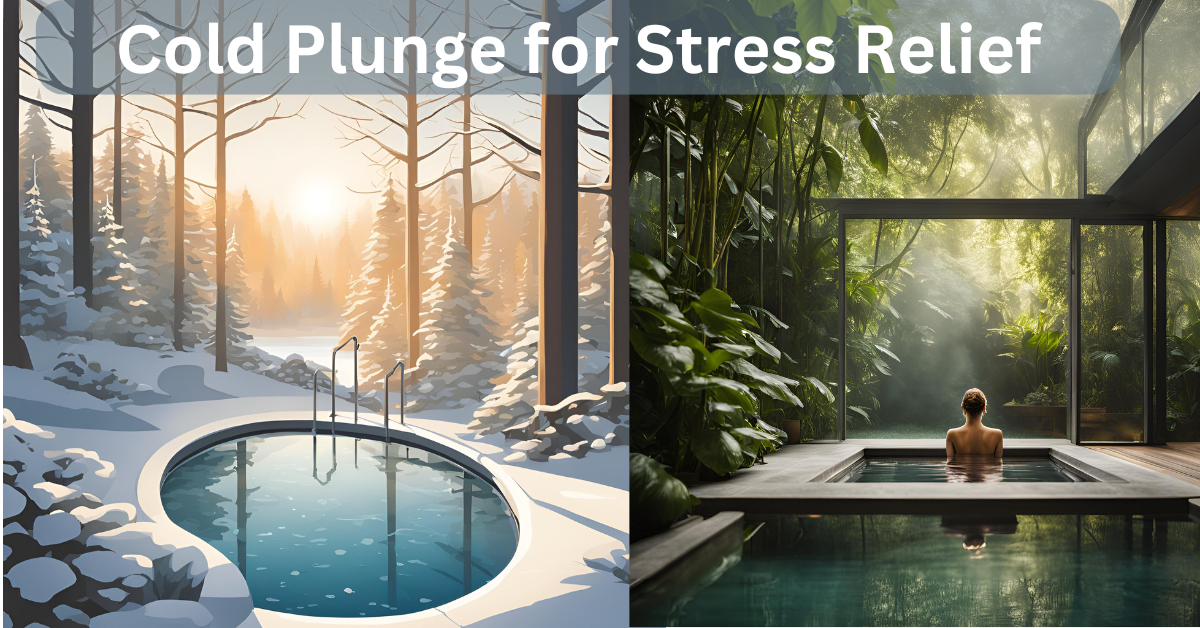Cold plunging has become a popular practice not only for physical recovery but also for its profound stress-relief benefits. Submerging in cold water triggers a variety of physiological responses that calm the nervous system, reduce anxiety, and promote a sense of well-being. This article will explore how cold plunging can lower stress levels and provide tips on incorporating it into your routine for relaxation.
How Cold Plunging Reduces Stress
1. Activation of the Parasympathetic Nervous System
Cold exposure stimulates the vagus nerve, which activates the parasympathetic nervous system, responsible for “rest-and-digest” functions. When this system is engaged, your heart rate slows down, cortisol levels drop, and your body moves into a state of relaxation.
This shift helps you manage the emotional and physical toll of stress, leaving you feeling calmer and more centered. The vagus nerve also regulates mood, making cold plunging an effective tool for both anxiety relief and emotional well-being.
Learn more about vagus nerve activation and relaxation from Cleveland Clinic.
2. Reduction of Cortisol Levels
Cortisol, the body’s primary stress hormone, rises in response to pressure or anxiety. Chronically high cortisol levels are linked to fatigue, irritability, and cognitive decline. Regular cold plunging has been shown to reduce cortisol production, leading to:
- Improved mood stability
- Decreased anxiety
- Better stress management
In one study published by the Journal of Neuroendocrinology, participants reported a noticeable reduction in cortisol levels after routine cold exposure.
3. Release of Endorphins for Mood Elevation
Endorphins, the body’s natural “feel-good” chemicals, are released during cold plunging. This surge provides a boost in mood, helping you feel more positive and relaxed after each session.
The release of endorphins can have effects similar to those of exercise, leaving you with a natural sense of euphoria and promoting relaxation, even on stressful days.
For insights into the impact of endorphins on mood, check out this resource on Healthline.
4. Enhanced Emotional Regulation through Adaptation
Cold immersion teaches your body and mind to adapt to discomfort, which translates to better emotional regulation in daily life. When faced with stressful situations, your ability to remain calm and composed improves over time.
This resilience is developed through the practice of managing controlled stress—the cold water shock—which enhances your capacity to handle unexpected emotional triggers.

Key Benefits of Cold Plunge for Relaxation
1. Quick Calm in Moments of Stress
Even a brief cold plunge can provide an immediate sense of calm. The physiological effects—like reduced heart rate and cortisol—kick in fast, making cold plunging a reliable tool for instant stress relief.
- After a long day at work, cold plunging can help release tension.
- It’s also useful for managing pre-performance anxiety before public speaking or important events.
2. Better Sleep through Nervous System Reset
Stress often disrupts sleep, making it harder to unwind at night. Cold immersion helps reset the nervous system, promoting deeper relaxation and better sleep quality.
- Lowered body temperature after a plunge prepares your body for sleep.
- Reduced cortisol ensures uninterrupted rest throughout the night.
Better sleep results in lower stress levels the next day, creating a positive feedback loop for mental and emotional well-being. Explore more tips on improving sleep at Sleep Foundation.
3. Reduced Muscle Tension and Relaxation of Body and Mind
Stress manifests not only mentally but also physically, leading to tight muscles and tension headaches. Cold immersion promotes muscle relaxation by improving blood flow and reducing inflammation, which translates to a calmer state of mind.
This dual effect—relieving both physical and mental tension—makes cold plunging a comprehensive stress management practice.

How to Incorporate Cold Plunging for Stress Relief
1. Start with Short Sessions
- Begin with 1 to 2 minutes at a moderate cold temperature (50-59°F or 10-15°C).
- As your body adapts, increase the time gradually to 5 minutes or more.
2. Practice Consistently
- Aim for 3-4 sessions per week to experience long-term stress relief benefits.
- Consistency is key to reaping the full effects on your mood and nervous system.
3. Use Cold Plunging in Stressful Moments
- If you feel overwhelmed, take a quick plunge to reset your mind.
- Even splashing cold water on your face or a cold shower can have similar effects in moments of acute stress.
4. Combine with Breathing Exercises
- Pair cold plunging with deep, rhythmic breathing to amplify the calming effects.
- Techniques like Wim Hof breathing are particularly effective when combined with cold immersion.
FAQs
Most people feel an immediate reduction in stress within minutes of cold immersion. Regular practice, however, enhances the long-term benefits by building emotional resilience.
Cold plunging is not a replacement but rather a complementary tool to other practices like meditation, yoga, or therapy. It works best when integrated into a holistic stress management routine.
While generally safe, cold immersion may not be suitable for individuals with certain cardiovascular conditions. It’s recommended to consult with a healthcare provider before starting, especially if you have any pre-existing medical conditions.
For sustained benefits, aim for 3 to 4 plunges per week. This frequency helps regulate your nervous system and reduces chronic stress over time.

Scientific Evidence Supporting Cold Plunge for Stress Reduction
Scientific research highlights several key findings about cold exposure and stress relief:
- Journal of Neuroendocrinology: Found that cold immersion lowers cortisol, the stress hormone, leading to improved relaxation.
- Frontiers in Psychology: Reported that regular cold exposure promotes mental well-being by reducing anxiety and elevating mood.
- PubMed Central Study: Demonstrated that vagus nerve stimulation via cold immersion reduces the body’s stress response, fostering calmness.
For further exploration, visit PubMed for peer-reviewed studies on the benefits of cold therapy.
Conclusion
Cold plunging is a powerful and natural way to reduce stress and promote relaxation. By activating the parasympathetic nervous system, lowering cortisol levels, and triggering the release of mood-enhancing endorphins, cold immersion provides both immediate and long-term relief from stress.
Whether you’re looking to unwind after a hectic day or develop resilience against daily stressors, cold plunging offers a simple yet effective method for achieving mental calm and emotional balance. When practiced consistently, it can become a vital part of your stress management toolkit, helping you live with greater ease and clarity.
So, take the plunge—your mind and body will thank you!





